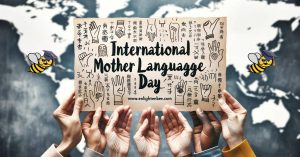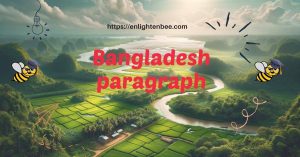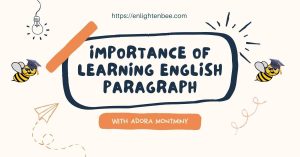1. Diaspora Paragraph
A diaspora is a group of people who have left their original country to live in other places around the world. They might have moved for different reasons, such as looking for better job opportunities, escaping conflict, or studying abroad. Even though they live far away from their home country, they often keep a strong connection with it. They may celebrate the same holidays, eat the same food, and teach their children the same language and traditions. For example, the Bangladeshi diaspora in the United Kingdom or the United States continues to celebrate Pohela Boishakh and speak in Bangla. They also send money back home, which can help improve the economy. However, living in a new country can also be tough. They may face discrimination, have trouble learning a new language, or miss their family and friends back home. But, diasporas also bring different cultures together, making the world more diverse and interesting.
Difficult words for Diaspora Paragraph:
- Diaspora (অভিবাসী): People who have spread or been dispersed from their homeland.
- Conflict (সংঘাত): A serious disagreement or argument.
- Traditions (ঐতিহ্য): The transmission of customs or beliefs from generation to generation.
- Economy (অর্থনীতি): The wealth and resources of a country in terms of the production and consumption of goods and services.
- Discrimination (বৈষম্য): The unjust or prejudicial treatment of different categories of people.
- Diverse (বৈচিত্র্যময়): Showing a great deal of variety.
2. Diaspora Paragraph
Diaspora refers to a community of people who live outside their country of birth or ancestry but maintain connections with it. This term often describes people who have migrated for reasons such as seeking employment, pursuing educational opportunities, or escaping situations of conflict or oppression. An example close to us is the Bangladeshi diaspora, who, despite living in far-off lands like the UK, USA, or Australia, maintain a strong bond with their native land. They continue to celebrate traditional festivals like Pohela Boishakh, Eid, and Durga Puja, practicing cultural rituals and teaching their children the Bangla language. Often, they form associations and community groups to stay connected and support each other in the foreign land. In many ways, they act as cultural ambassadors, introducing their adopted homes to the richness of Bangladeshi traditions. However, life in the diaspora can also be challenging. They may face discrimination and struggle with language barriers. They may also experience a sense of dislocation, missing their families, and the familiarity of their homeland. Despite these struggles, diaspora communities contribute significantly to their homeland. Many send remittances back to Bangladesh, boosting the economy. Moreover, they often invest in businesses and educational initiatives in their native land. Through these activities, diaspora communities play a significant role in the global exchange of cultures and ideas, enhancing understanding and tolerance among diverse groups of people.
Difficult words for Diaspora Paragraph:
- Diaspora (অভিবাসী): A community of people living away from their homeland.
- Ancestry (পূর্বপুরুষ): One’s family or ethnic descent.
- Conflict (সংঘাত): A serious disagreement or argument.
- Oppression (নিপীড়ন): Prolonged cruel or unjust treatment or control.
- Ambassadors (দূত): People who represent or promote specific activity.
- Dislocation (বিচ্যুতি): Displacement from a normal position.
- Remittances (অর্থ প্রেরণ): Money sent to another place, especially abroad.
- Tolerance (সহনশীলতা): The ability or willingness to tolerate the existence of opinions or behavior that one dislikes or disagrees with.
3. Diaspora Paragraph
Diaspora, a term often applied to describe the dispersion or scattering of people away from their ancestral homeland, carries profound connotations and implications for the course of human history. Frequently associated with forced displacement due to war, conflict, or persecution, the concept has evolved to encompass various other motivations, such as economic or educational pursuits, that impel individuals to seek new shores. Notably, these migratory populations, regardless of their location, tend to retain a profound connection with their homeland. They cultivate and transmit their cultural heritage, becoming emissaries of their native customs, traditions, and languages in their adopted countries.
For instance, the Bangladeshi diaspora, dispersed across continents, perpetuates the Bangla language, celebrates traditional festivals like Pohela Boishakh and Eid, and forms cohesive social units or associations to provide mutual support. However, diasporic life can also be fraught with challenges. Instances of discrimination, struggle with language barriers, and a feeling of dislocation or homesickness can plague these communities. Despite such adversities, diasporas exert a significant influence on their homelands.
The Bangladeshi diaspora, for example, contributes substantially to the national economy through remittances. Moreover, they often become conduits for foreign investment, and their exposure to global perspectives can spur innovation and progress back home. This reciprocal relationship between the diaspora and their homeland catalyzes a dynamic exchange of ideas, fostering mutual understanding, and promoting a more inclusive and interconnected world.
Difficult words for Diaspora Paragraph:
- Diaspora (প্রবাসী): A community of people living away from their homeland.
- Ancestral (পূর্বপুরুষ): Of, belonging to, inherited from, or denoting a person’s ancestors.
- Persecution (নিপীড়ন): Hostility and ill-treatment, especially because of race or political or religious beliefs.
- Emissaries (দূত): A person sent on a special mission.
- Discrimination (বৈষম্য): The unjust or prejudicial treatment of different categories of people, especially on the grounds of race, age, or sex.
- Dislocation (বিচ্যুতি): Displacement from a normal position.
- Reciprocal (পারস্পরিক): Given, felt, or done in return.
- Catalyzes (অনুঘটক): To cause or accelerate a reaction.
- Conduits (নালী): A channel for conveying water or other fluid.
4. Diaspora Paragraph
The concept of diaspora, a term derived from the Greek ‘diacerein’ meaning ‘to scatter’, refers to the dispersion of a population from their original homeland to different parts of the world. This dispersion can be precipitated by a myriad of reasons – socio-political upheavals, economic disparities, or simply the quest for a better life. The journey of diaspora communities, while marked by hardships, also brings about an enriching exchange of cultures and ideas. These groups act as the cultural ambassadors of their homeland, keeping their traditions alive and introducing them to their new societies.
An interesting example is the Bangladeshi diaspora spread across the globe, maintaining a vibrant cultural presence wherever they have settled. From the celebration of Bengali New Year to Eid, the spirit of Bangladeshi heritage is kept alive through community gatherings and festivities. Beyond cultural preservation, diasporic communities often play a crucial role in bolstering the economies of their home countries. In the context of Bangladesh, remittances sent by its diaspora form a significant portion of the country’s foreign exchange reserves. Yet, the experience of being part of a diaspora can also be fraught with challenges, such as grappling with identity crises, facing discrimination, or negotiating the tension between assimilation and maintaining cultural uniqueness.
Despite these hurdles, diasporas contribute to enriching the socio-cultural fabric of the world, embodying the idea of a global community and reflecting the diversity and dynamism of human existence.
Difficult words for Diaspora Paragraph:
- Diaspora (প্রবাসী): The dispersion of people from their original homeland to different parts of the world.
- Precipitated (চরম অবস্থায় নিয়ে আসা): Caused to happen suddenly or prematurely.
- Cultural ambassadors (সাংস্কৃতিক দূত): Individuals who represent and promote their own culture in a foreign land.
- Heritage (ঐতিহ্য): Tradition, values, and practices inherited from previous generations.
- Remittances (প্রেরণকৃত টাকা): Money sent back to the home country by individuals living abroad.
- Fraught (ভরা): Filled with something undesirable.
- Assimilation (একত্রীকরণ): The process of absorbing and integrating into a wider society or culture.
- Socio-cultural fabric (সামাজিক-সাংস্কৃতিক বস্ত্র): The combined social and cultural features of a society or a community.
- Dynamism (গতিশীলতা): The quality of being dynamic and energetic.
Most important paragraphs
| # | Paragraph Name | Link |
| 1 | Adolescence Paragraph | Click Here |
| 2 | Deforestation Paragraph | Click Here |
| 3 | Environment Pollution Paragraph | Click Here |
| 4 | Global Warming Paragraph | Click Here |
| 5 | Load Shedding Paragraph | Click Here |
| 6 | Metro Rail Paragraph | Click Here |
| 7 | Moonlit Night Paragraph | Click Here |
| 8 | Online Class and Traditional Class Paragraph | Click Here |
| 9 | Price Hike paragraph | Click Here |
| 10 | Road Accident paragraph | Click Here |
Join Our Community on Facebook.









